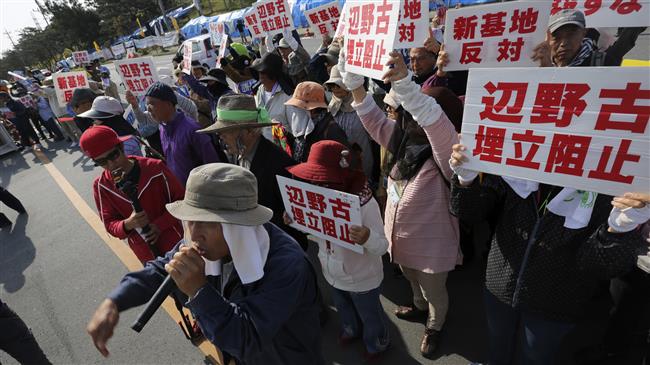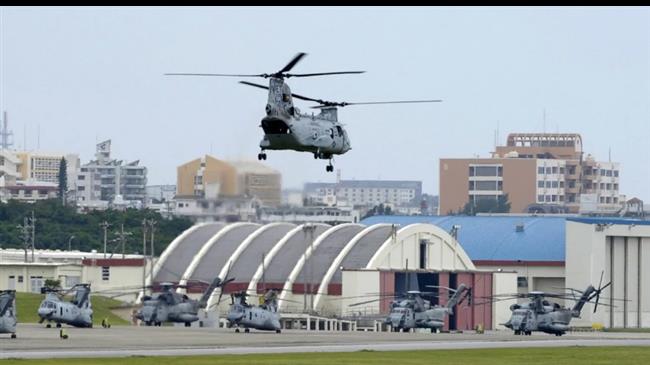Okinawa set for referendum on US base relocation
Official campaigning has kicked off in Japan's Okinawa for a referendum on a controversial plan to relocate a US airbase, which has long been a source of concern for residents on the tiny island.
Campaigning began on Thursday for the non-binding vote, which is due to be held on February 24.
Voters will be offered three choices to answer in the referendum; they should answer “yes,” “no” or “neither” to a question if the support the relocation of the US Marine Corps. Futenma Air Station to remote coastal region of Henoko.
The relocation plan, backed by the government of Prime Minister Shinzo Abe, offers the closing of the base, currently located in the densely-populated part of the island and opening of a replacement facility some fifty kilometers away at Nago district.
The plan, however, is not supported by the officials in Okinawa.
Okinawa governor Denny Tamaki denounced the central government move, saying he hopes the referendum will offer Okinawans an opportunity to voice their opposition to the move.
Though the vote is not legally binding, Tamaki offered campaigning against the plan.
"This is an important opportunity to directly express your own will. I hope Okinawa residents will cast their precious votes," he told reporters on Thursday.
Local media reported on Thursday that those opposed to the plan took to the streets to voice their opposition.
Japan to promote relocation of US base in #Okinawa regardless of referendum https://t.co/VAa2GpR3Pi pic.twitter.com/NcWtSYZY0X
— Sputnik US (@SputnikNewsUS) February 15, 2019
People also held rallied in the capital of Naha and Henoko to call on people to vote "no" in the referendum.
An ordinance on the referendum says the governor must notify Prime Minister Abe and US President Donald Trump following the outcome of the vote.
The local government must “respect” the outcome of a referendum if it’s approved by at least a quarter of eligible voters.
Chief Cabinet Secretary Yoshihide Suga said on Thursday that the government offered the plan to "ease the burden on the Okinawan people in a clearly transparent way," saying Tokyo has no plans to halt the relocation plan.
The plan was first agreed between Tokyo and Washington back in 1996, but it has been stalled by local politicians so far.
Okinawa hosts more than half of the nearly 47,000 American military service members stationed in Japan.
While Tokyo insists that the base is necessary on the island, residents oppose the presence of US forces in the homeland. They argue that moving the base to another part of Japan is not a solution, since it would still pose an environmental threat.
Okinawa residents have long demanded that the US base be totally removed from the island citing allegations of sexual abuse by the American soldiers.
Anti-US sentiments have even been on the rise after a US serviceman was found guilty in December 2017 for rape and murder of a 20-year-old Okinawa woman.
Kenneth Franklin Shinzato, who worked at the Kadena air base in Okinawa, admitted to charges of rape resulting in death of Rina Shimabukuro in April 2016.
Late last year, a high court in Japan upheld a lower court’s ruling that sentenced Shinzato to life in prison.
Hezbollah attacks Israeli forces after Lebanese homes blown up
World leaders, states hail ICC arrest warrants for Netanyahu, Gallant
MP: US accountable for possible Israeli 'foolishness' to attack Iraq
VIDEO | Israeli policies strangle Palestinian agriculture, economy
Iran's president offers condolences to Pakistan over terrorist attack
Canada’s Yukon town council at standstill over refusing oath to King Charles
Yemen's Houthi calls for jihad to protect Palestine against Israel
VIDEO | Internal rifts within Israel














 This makes it easy to access the Press TV website
This makes it easy to access the Press TV website